 Petzlover
Petzlover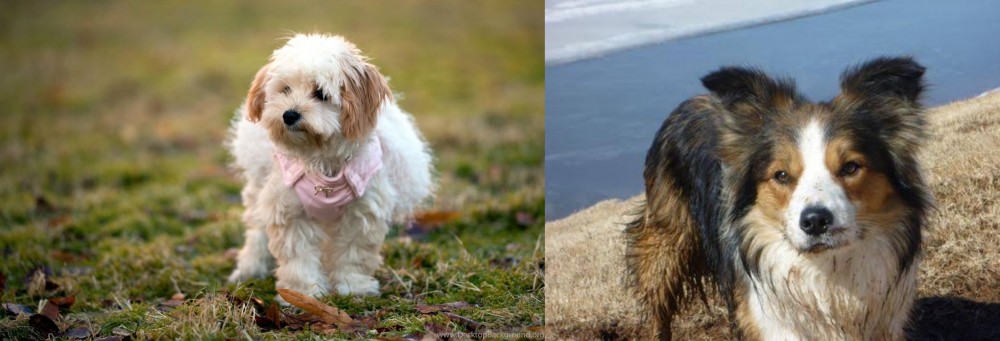 Both West Highland White Terrier and Welsh Sheepdog are originated from United Kingdom. West Highland White Terrier may grow 26 cm / 10 inches shorter than Welsh Sheepdog. West Highland White Terrier may weigh 15 kg / 33 pounds lesser than Welsh Sheepdog. Both West Highland White Terrier and Welsh Sheepdog has almost same life span. West Highland White Terrier may have less litter size than Welsh Sheepdog. West Highland White Terrier requires High Maintenance. But Welsh Sheepdog requires Low Maintenance
Both West Highland White Terrier and Welsh Sheepdog are originated from United Kingdom. West Highland White Terrier may grow 26 cm / 10 inches shorter than Welsh Sheepdog. West Highland White Terrier may weigh 15 kg / 33 pounds lesser than Welsh Sheepdog. Both West Highland White Terrier and Welsh Sheepdog has almost same life span. West Highland White Terrier may have less litter size than Welsh Sheepdog. West Highland White Terrier requires High Maintenance. But Welsh Sheepdog requires Low Maintenance
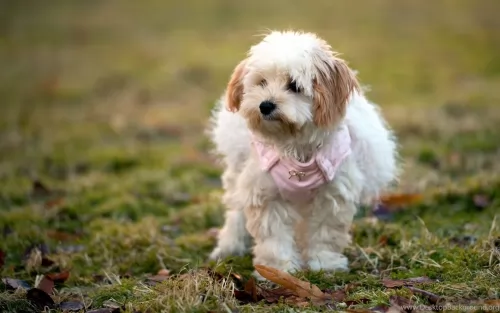 The West highland white terrier originated from Poltalloch in Scotland. So they were initially called as Poltalloch terrier and after that they were called as Roseneath terrier. They were initially used for hunting fox, badger, otter and in killing the vermin like rats.
The West highland white terrier originated from Poltalloch in Scotland. So they were initially called as Poltalloch terrier and after that they were called as Roseneath terrier. They were initially used for hunting fox, badger, otter and in killing the vermin like rats.
The breed history says that Colonel Malcolm of Poltalloch was the reason for the Westie's white colour. This is because in 19th centuryhe went for hunting with his dogs and accidentally he shot his dog as its colour was as fox. So he decided to breed only white colour dogs.
 The Welsh Sheepdog is sometimes referred to as the Welsh Collie, but it is not a collie in anyway. It is the cross between the Border Collie and Welsh Sheepdog that is actually the Welsh Collie. The sheepdog was bred for herding not appearance and they are not all consistent in looks and size. They are a collie type but do not have recent collie ancestors. In fact the Border Collie has basically replaced the Welsh Sheepdog in herding sheep in Wales. The Welsh Sheepdog is still being bred as an indigenous breed. They are still prized for their ability to work independently and herding cattle, pigs, horses and goats as well as sheep. They were originally drovers.
The Welsh Sheepdog is sometimes referred to as the Welsh Collie, but it is not a collie in anyway. It is the cross between the Border Collie and Welsh Sheepdog that is actually the Welsh Collie. The sheepdog was bred for herding not appearance and they are not all consistent in looks and size. They are a collie type but do not have recent collie ancestors. In fact the Border Collie has basically replaced the Welsh Sheepdog in herding sheep in Wales. The Welsh Sheepdog is still being bred as an indigenous breed. They are still prized for their ability to work independently and herding cattle, pigs, horses and goats as well as sheep. They were originally drovers.
In the 18th century there were many different Welsh herding dogs and one drover might have 4-6 different types of sheepdogs as guard dogs, herders and hunters. Most of these breeds were taller than the Welsh Sheepdog. By 1940 there aere only a couple of breeds doing these jobs in Wales. The purebred Welsh Hillman and Black and Tan Sheepdog were on the verge of extinction at that point.
At that time the most common dogs were descendants of the Black and Tan Sheepdog and the Border Collie. The Welsh Sheepdog was still working in central Wales and in the north country. They were purely a working breed and not a show breed in any way. They remain that today.
They are a landrace and very rare today. They have been around for more than 800 years with no effort at standardization for this working dog. They are only registered with the WSS or Welsh Sheepdog Society and the DRA Dog Registry of America.
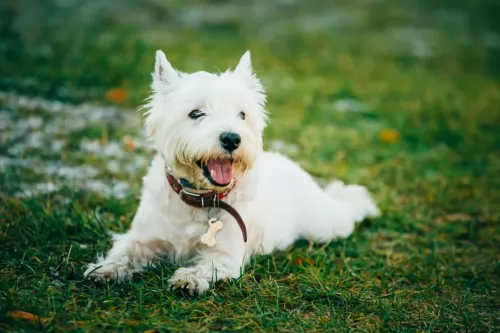 The Westie can be said as that a small dog having the talents of the big dog. They are very popular for their obedience. They are also working as therapy dogs and also some in search and rescue teams. The home having Westie will have fun always and be enthusiastic. They will suit them for country or city living, but they like to live with their family. They are well suitable for apartment living, but some training should be given to them for not barking. They can stay in home when you are at work. Westie can be taken to travel, whether it may be long vacation or a short visit.
The Westie can be said as that a small dog having the talents of the big dog. They are very popular for their obedience. They are also working as therapy dogs and also some in search and rescue teams. The home having Westie will have fun always and be enthusiastic. They will suit them for country or city living, but they like to live with their family. They are well suitable for apartment living, but some training should be given to them for not barking. They can stay in home when you are at work. Westie can be taken to travel, whether it may be long vacation or a short visit.
They are quick learners and so training them is not difficult. Mistakes of them can be corrected patiently since they don't like harsh activities against them. Westie will definitely bark when he sees something or hear different sounds. He will bark on seeing visitors or even other dogs. Sometimes they will bark for very silly things but when given appropriate training in their young stage, they can bark only for alerts.
 Bred for their herding abilities not their appearance, the Welsh Sheepdog can vary in color, build and size. They have long legs, broad chests and wide muzzles. They are all around bigger than the Border Collie. They come in black and white, tricolor, red and white and merle. The coat can be short or long and the ears pricked and folded at the top.
Bred for their herding abilities not their appearance, the Welsh Sheepdog can vary in color, build and size. They have long legs, broad chests and wide muzzles. They are all around bigger than the Border Collie. They come in black and white, tricolor, red and white and merle. The coat can be short or long and the ears pricked and folded at the top.
They look most like the Border Collie with a taller, broader, more solid build. They typically are stronger than the Border. Their head is distinctly collie shaped, flat and broad with the wide muzzle. The nose is black and the eyes are oval and brown. The merles can have striking blue eyes.
This is an athletic dog and you can tell by looking at her. Well muscled, broad back and neck with a long upward tail. Their tough paws are perfect for the rough terrain and Wales mountainsides.
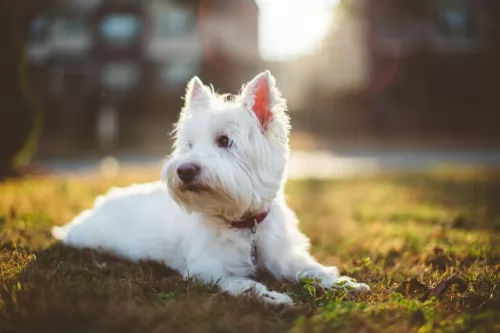 The Westie is friendly with children but not all the time. So some care should be taken while they are near children.
The Westie is friendly with children but not all the time. So some care should be taken while they are near children.
They like to chase rodents like rabbits as they are interested in hunting.
They are suitable for apartment living unless they are left alone for a very long time. They love cold weather more than hot.
They can be trained by giving some extra efforts.
 1Children friendliness not really – aloof and concerned with job- all this dog wants to do is work.
1Children friendliness not really – aloof and concerned with job- all this dog wants to do is work.
3.Adaptability – Not an inside dog in any way. They need several hours of exercise per day.
 Usually an indigenous rare breed does not have a lot of genetic or hereditary health concerns. This is a little different with the Welsh Sheepdog can suffer from any of these conditions.
Usually an indigenous rare breed does not have a lot of genetic or hereditary health concerns. This is a little different with the Welsh Sheepdog can suffer from any of these conditions.
• Epilepsy – Most respond well to medication and others might not even need medication.
• Collie Eye Anomaly – This is common in collie breeds like the rough coated collie. The development of the Choroid is impaired resulting in harm to the circulation of blood to the eye.
• Atopic Dermatitis – Allergic skin disorder irritating paws, ears, and perineum.
• PRA Progressive Retinal Atrophy - deterioration of the retina can lead to blindness. Inherited.
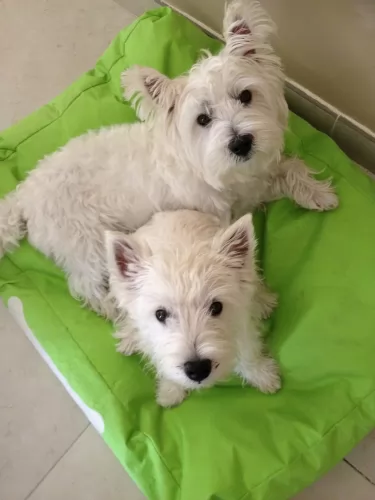 The puppy should be fed 3 to 4 times per day as it requires a considerable amount for their growth. Cooked chicken breast and turkey are best for them and also vegetables should be given to them. Beef and chicken should be kept a limit as it will lead to itchy skin and allergies.
The puppy should be fed 3 to 4 times per day as it requires a considerable amount for their growth. Cooked chicken breast and turkey are best for them and also vegetables should be given to them. Beef and chicken should be kept a limit as it will lead to itchy skin and allergies.
The preferable food for the Westie is home cooked. The home food will only contain all the essential nutrients for the Westie.
Eventhough the Westie is suitable for apartment living it is recommended to have a daily walk for him to be active and refreshing.
They should be made to play for atleast 30 minutes per day for their health as to not gain overweight. Grown up children can play with them as they like it.
 1Feeding the puppy active dog feed high quality high protein food. 3-4 x day 1-2 cups
1Feeding the puppy active dog feed high quality high protein food. 3-4 x day 1-2 cups
2.Feeding the adult Active dog feed high quality high protein 2x day 2 cups a day.
4. Games and Exercises This is an extremely active breed that needs a job. They are not the best pets they are working dogs. They need a lot of exercise. They are not good at living indoors. At least 2 hours of exercise daily is a must.